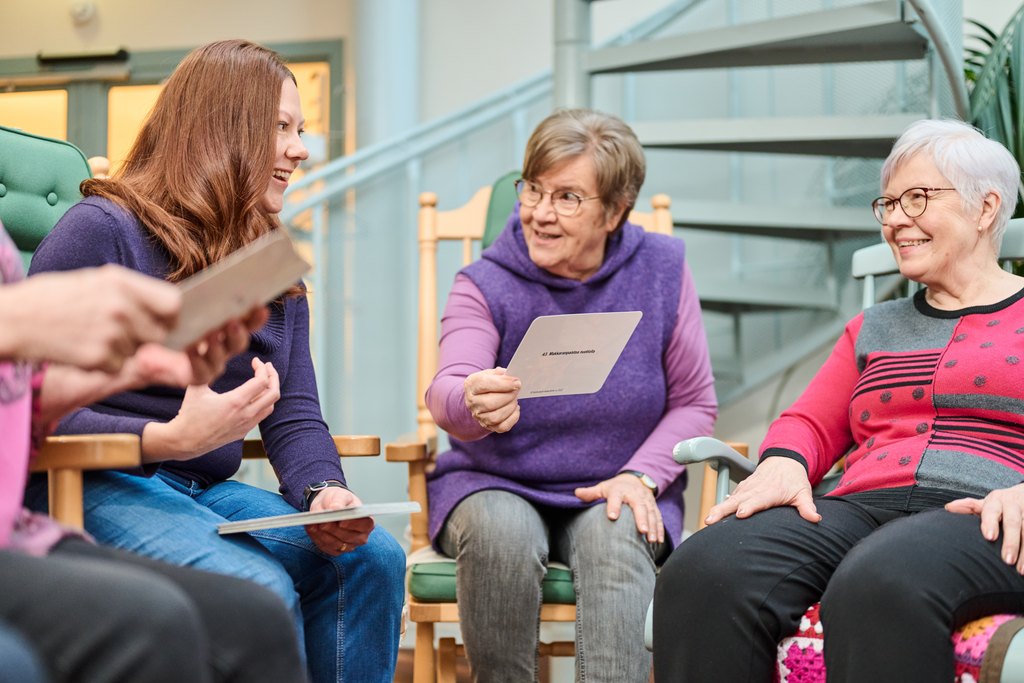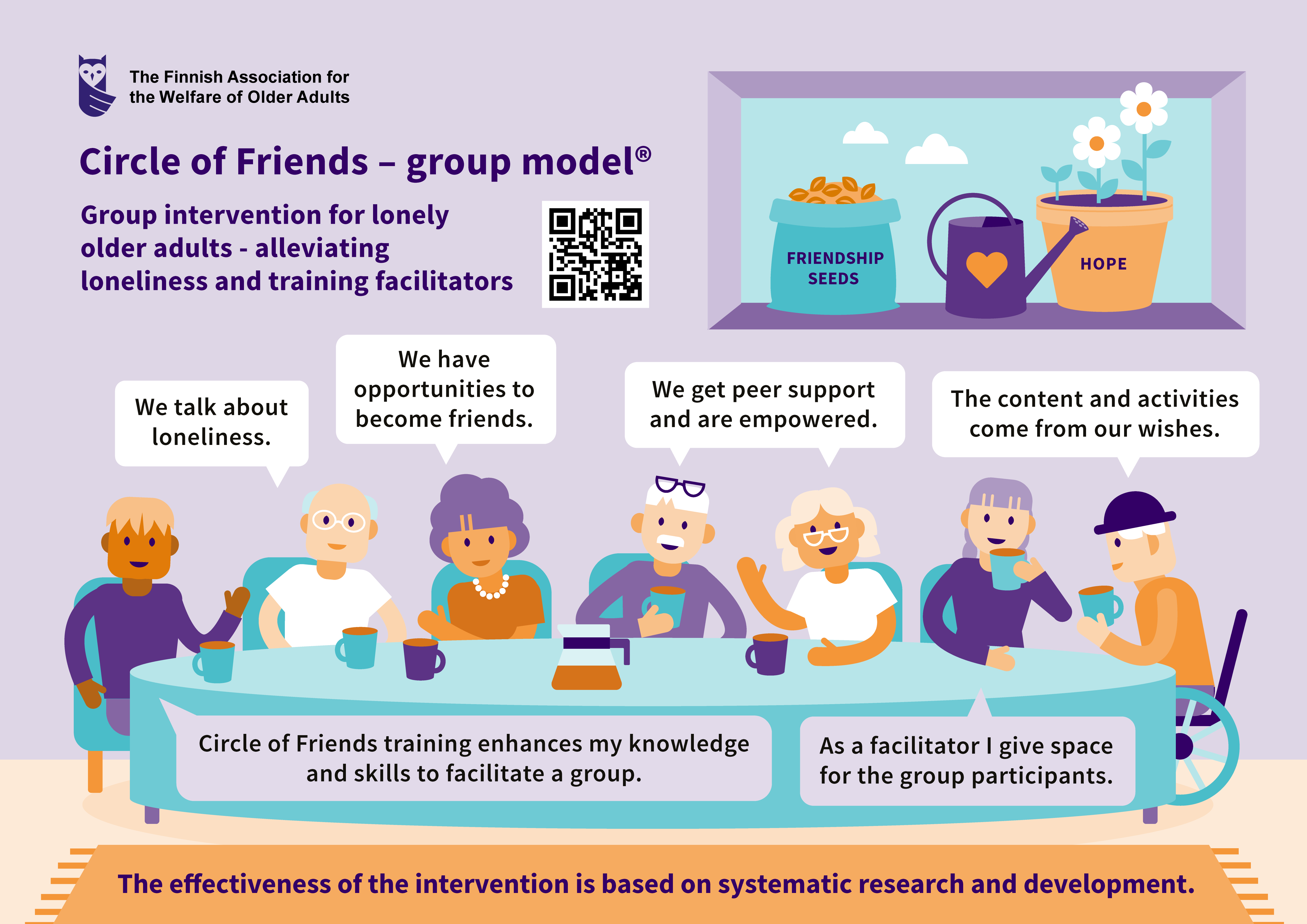Wellbeing grows through group activities.
Circle of Friends – group intervention alleviates loneliness among older adults.

Ystäväpiiri-toiminta – Circle of Friends is based on rigorous training of group facilitators.
The Circle of Friends – group intervention for lonely older adults has been systematically and widely implemented and disseminated in Finland for 19 years. The main idea of the Circle of Friends group is to alleviate and prevent loneliness of older adults.
Circle of Friends – group is a closed group, where the participants – older adults – meet their peers 12 times in three months. The main objectives of the group are alleviation of the participants’ loneliness and to promote their well-being. The main aim is also to help the group to become self-supportive: facilitators encourage participants to continue meeting on their own.
We have trained about 1250 Circle of Friends – group facilitators in Finland. About 13 000 older adults have participated in Circle of Friends – groups.
Circle of Friends -facilitator training
Circle of Friends – facilitator training is a 5-6 months training model for people, who are interested in facilitating a group. The most important criterion for a group facilitator is motivation to facilitate a group and to alleviate loneliness of older adults. The facilitator trainings are organized as five one-day workshops onsite facilitator training in Finland, and 10 half-day workshops online facilitator training in Finland and abroad. During the training process the facilitators facilitate their first Circle of Friends – group as a facilitator pair. The aim of the Circle of Friends – facilitator training is to enhance the participants’ (facilitators’) knowledge and skills to plan and facilitate
Circle of Friends – group model, which have the following elements:
- closed group dynamics
- target-oriented work and learning
- enhancing interaction between participants
- peer support
- empowerment
- enhancing self-efficacy and mastery

Please, contact us
Raita Lehtonen
Regional coordinator, Circle of Friends
+358 50 373 1057
raita.lehtonen@vtkl.fi
Watch our videos
References
Jansson A (2020): Loneliness of older people in long-term care facilities. Doctoral dissertation. University of Helsinki, Faculty of Medicine, Department of General Practice and Primary Health Care
Doctoral Program in Population Health
2019 Jansson A, Karisto A, Pitkälä K. Time- and place-dependent experiences of loneliness in assisted living facilities. Oral-poster IAGG-ER 23. – 25.5.2019
2018, Anu H Jansson, Niina M Savikko & Kaisu H Pitkälä (2018): Training professionals to implement an RCT-based group model for alleviating loneliness. Poster Presentation 24NKG 2018, Lessons of a lifetime, Oslo
Anu H Jansson, Niina M Savikko & Kaisu H Pitkälä (2017): Training professionals to implement a group model for alleviating loneliness among older people – 10-year follow-up study, Educational Gerontology.
Jansson A.H, Muurinen S, Savikko N, Soini H, Suominen M.M, Kautiainen H, Pitkälä K.H. Loneliness in nursing homes and assisted living facilities: prevalence, associated factors and prognosis. Jour Nursing Home Res 2017;3:43-49
Jansson A, Ylimaa T, Helin S, Pitkälä K. Circle of Friends – Group Model Alleviating Loneliness. Poster Presentation IAGG-ER Dublin 2015, Social Gerontology, Fri. 24th April.
Pitkälä KH, Routasalo P, Kautiainen H, Sintonen H, Tilvis RS.Effects of socially stimulating group intervention on lonely, older people’s cognition: a randomized, controlled trial. Am J Geriatr Psychiatry, Volume: 19, Issue: 7, Date: 2011 Jul , Pages: 654-63.
Savikko N, Routasalo P, Tilvis R, Pitkälä K. Psychosocial group rehabilitation for lonely older people: favourable processes and mediating factors of the intervention leading to alleviated loneliness. International Journal of Older People Nursing 2010 Mar 5 (1): 16-24.
Routasalo PE, Pitkälä KH, Kautiainen H, Tilvis RS. Effects of psychosocial group rehabilitation on social functioning, loneliness and well-being of lonely, older people: randomized controlled trial. Journal of Advanced Nursing Feb2009, Vol. 65,2,297-305.
Pitkälä H, Routasalo P, Kautiainen H, Tilvis RS. Effects of Psychosocial Group Rehabilitation on Health, Use of Health Care Services, and Mortality of Older Persons Suffering From Loneliness: A Randomized, Controlled Trial. Journal of Geronotology 2009:64,792-800.